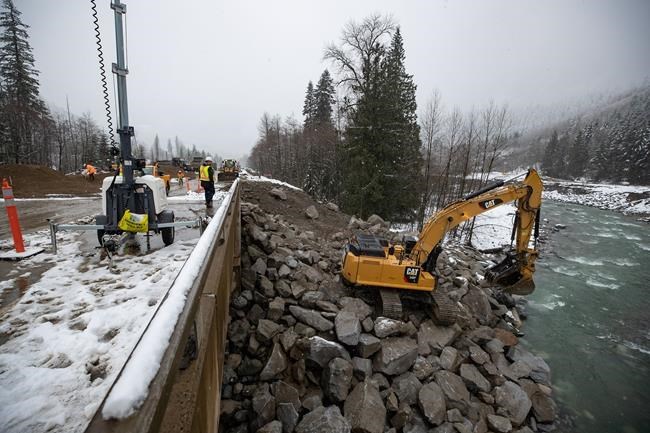VICTORIA — The British Columbia government is lifting a restriction on gasoline for the general public that was put in place after flooding and landslides cut off supply.
Public Safety Minister Mike Farnworth said the 30-litre limit per visit to the pumps proved effective and will lift on Tuesday.
Gas and diesel rationing took effect Nov. 19 for drivers in the Lower Mainland, Vancouver Island and other southern B.C. locations in order to ensure there was enough fuel for essential traffic, such as emergency vehicles and supply chain transport.
"We asked people to pull together and they did. We could have failed or we could have succeeded, and we succeeded because people did the right thing," Farnworth said during a news briefing on flood recovery Monday.
He said with additional fuel still coming in by barge and rail, the government is confident in the supply chain.
The Trans Mountain pipeline delivers the majority of fuel to southern B.C. but was taken out of service for three weeks as a precaution when a series of storms lashed the area.
The pipeline resumed operations Dec. 5 at reduced pressure and the company said it expected to return to normal capacity within a week.
Farnworth also announced a two-week extension to the provincial state of emergency as crews continue work to reopen highways and while traffic on some major routes is limited to essential services.
The order restricts non-essential travel on Highway 3 from Hope to Princeton and on Highway 99 between Pemberton and Lillooet.
"I know the highway closures and restrictions are challenging but they are necessary to maintain a steady flow of goods across the province," Farnworth said.
Transportation Minister Rob Fleming heralded the work of crews who have "defied the odds" in their progress on the Coquihalla Highway. The major arterial roadway may reopen even sooner than the early January date announced late last week, he said.
Fleming visited work sites along the highway on Friday with federal Transport Minister Omar Alghabra and described the damage as "unfathomable."
More than 20 sites along a 130-kilometre corridor were impacted by mudslides and washouts. About 300 workers are using 200 pieces of heavy equipment to repair site by site around the clock, he said.
"The Coquihalla is alive with construction activity every waking hour," Fleming said.
The highway was originally slated to reopen in late January after last month's storm damage.
A full briefing is scheduled this week that will include details on the scope of repairs and a reopening timeline for commercial traffic on the Coquihalla, as well as details on when Highway 3 may be reassigned to general traffic, Fleming said.
"I expect by Wednesday we’ll be able to give something a lot more precise," he says.
The Ministry of Health advised owners of private drinking-water wells in areas that had been flooded to monitor their water quality.
In a news release Monday, it said all well water should be considered "not for human consumption" until the well is assessed and the water is disinfected and tested.
The Health Ministry said it was working with the Fraser Health and Interior Health authorities to make free sample kits and tests for bacteria available.
— By Amy Smart in Vancouver.
This report by The Canadian Press was first published Dec. 13, 2021.
The Canadian Press



